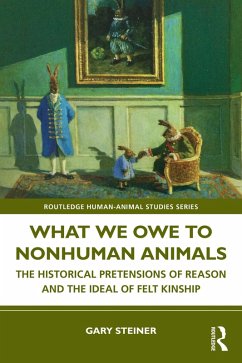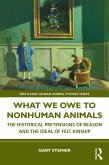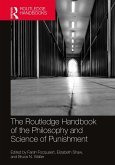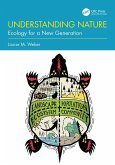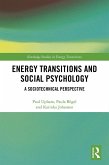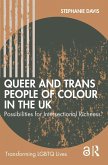Gary Steiner
What We Owe to Nonhuman Animals (eBook, ePUB)
The Historical Pretensions of Reason and the Ideal of Felt Kinship
40,95 €
40,95 €
inkl. MwSt.
Sofort per Download lieferbar

20 °P sammeln
40,95 €
Als Download kaufen

40,95 €
inkl. MwSt.
Sofort per Download lieferbar

20 °P sammeln
Jetzt verschenken
Alle Infos zum eBook verschenken
40,95 €
inkl. MwSt.
Sofort per Download lieferbar
Alle Infos zum eBook verschenken

20 °P sammeln
Gary Steiner
What We Owe to Nonhuman Animals (eBook, ePUB)
The Historical Pretensions of Reason and the Ideal of Felt Kinship
- Format: ePub
- Merkliste
- Auf die Merkliste
- Bewerten Bewerten
- Teilen
- Produkt teilen
- Produkterinnerung
- Produkterinnerung

Bitte loggen Sie sich zunächst in Ihr Kundenkonto ein oder registrieren Sie sich bei
bücher.de, um das eBook-Abo tolino select nutzen zu können.
Hier können Sie sich einloggen
Hier können Sie sich einloggen
Sie sind bereits eingeloggt. Klicken Sie auf 2. tolino select Abo, um fortzufahren.

Bitte loggen Sie sich zunächst in Ihr Kundenkonto ein oder registrieren Sie sich bei bücher.de, um das eBook-Abo tolino select nutzen zu können.
This book strongly challenges the Western philosophical tradition's assertion that humans are superior to nonhuman animals. It provides a full and direct moral status of nonhuman animals.
- Geräte: eReader
- mit Kopierschutz
- eBook Hilfe
Andere Kunden interessierten sich auch für
![What We Owe to Nonhuman Animals (eBook, PDF) What We Owe to Nonhuman Animals (eBook, PDF)]() Gary SteinerWhat We Owe to Nonhuman Animals (eBook, PDF)40,95 €
Gary SteinerWhat We Owe to Nonhuman Animals (eBook, PDF)40,95 €![The Routledge Handbook of the Philosophy and Science of Punishment (eBook, ePUB) The Routledge Handbook of the Philosophy and Science of Punishment (eBook, ePUB)]() The Routledge Handbook of the Philosophy and Science of Punishment (eBook, ePUB)47,95 €
The Routledge Handbook of the Philosophy and Science of Punishment (eBook, ePUB)47,95 €![Crime, Violence, and Global Warming (eBook, ePUB) Crime, Violence, and Global Warming (eBook, ePUB)]() John CrankCrime, Violence, and Global Warming (eBook, ePUB)64,95 €
John CrankCrime, Violence, and Global Warming (eBook, ePUB)64,95 €![Understanding Nature (eBook, ePUB) Understanding Nature (eBook, ePUB)]() Louise M. WeberUnderstanding Nature (eBook, ePUB)62,95 €
Louise M. WeberUnderstanding Nature (eBook, ePUB)62,95 €![Energy Transitions and Social Psychology (eBook, ePUB) Energy Transitions and Social Psychology (eBook, ePUB)]() Paul UphamEnergy Transitions and Social Psychology (eBook, ePUB)45,95 €
Paul UphamEnergy Transitions and Social Psychology (eBook, ePUB)45,95 €![Queer and Trans People of Colour in the UK (eBook, ePUB) Queer and Trans People of Colour in the UK (eBook, ePUB)]() Stephanie DavisQueer and Trans People of Colour in the UK (eBook, ePUB)0,00 €
Stephanie DavisQueer and Trans People of Colour in the UK (eBook, ePUB)0,00 €![Physical Activity in Natural Settings (eBook, ePUB) Physical Activity in Natural Settings (eBook, ePUB)]() Physical Activity in Natural Settings (eBook, ePUB)40,95 €
Physical Activity in Natural Settings (eBook, ePUB)40,95 €-
-
-
This book strongly challenges the Western philosophical tradition's assertion that humans are superior to nonhuman animals. It provides a full and direct moral status of nonhuman animals.
Hinweis: Dieser Artikel kann nur an eine deutsche Lieferadresse ausgeliefert werden.
Dieser Download kann aus rechtlichen Gründen nur mit Rechnungsadresse in A, B, BG, CY, CZ, D, DK, EW, E, FIN, F, GR, HR, H, IRL, I, LT, L, LR, M, NL, PL, P, R, S, SLO, SK ausgeliefert werden.
Hinweis: Dieser Artikel kann nur an eine deutsche Lieferadresse ausgeliefert werden.
Produktdetails
- Produktdetails
- Verlag: Taylor & Francis eBooks
- Seitenzahl: 280
- Erscheinungstermin: 27. September 2023
- Englisch
- ISBN-13: 9781000957440
- Artikelnr.: 68870224
- Verlag: Taylor & Francis eBooks
- Seitenzahl: 280
- Erscheinungstermin: 27. September 2023
- Englisch
- ISBN-13: 9781000957440
- Artikelnr.: 68870224
- Herstellerkennzeichnung Die Herstellerinformationen sind derzeit nicht verfügbar.
Gary Steiner is Professor of Philosophy Emeritus at Bucknell University.
Introduction
Chapter One: Background Ideals of Living
1. A Counterintuitive Idea
2. Background Ideals of Living in the Philosophical Tradition
3. Anthropocentric Implications of Some Contemporary Approaches
4. Anthropocentric and Non-Anthropocentric Background Ideals of Living
Chapter Two: The Essential Role and Pitfalls of Reason in Moral Judgment
1. Background Ideals of Living and Our Basic Understanding of Reason
2. Two Early Exponents of Anthropocentric Rationality: Aristotle and Seneca
3. The Enlightenment's Chief Exponent of Anthropocentric Rationality: Kant
4. Questioning the Traditional Commitment to the Primacy of Reason
Chapter Three: Historical Idealism and the Process of Critical Reflection
1. Rationality: Rethink or Reject?
2. Rorty's Challenge to Reason and Criteria
3. The Ideal of Critical Detachment Revisited
4. Ortega's Turn to Historical Reason
5. Miller's Actualism and the Problem of Universals
6. A Concluding Thought
Chapter Four: The Affective Dimension of Moral Commitment
1. Background Ideals of Living and the Putative Autonomy of Reason
2. A Positive Path Beyond the Limits of Reason?
3. Reclaiming a Guiding Place for the Emotions
4. Pre-Predicative Meaning and Affective Engagement
5. The Moral Community is Neither Exclusively Nor Primarily Human
Chapter Five: Felt Kinship: The Essential Tension Between Local and Global Commitments
1. The Power and Essential Limits of Reason
2. The Power and Essential Limits of Feeling or Emotion
3. Toward a Dialectical Conception of the Reason-Emotion Dichotomy
4. Toward a Well-Tempered Humanism
Bibliography
Chapter One: Background Ideals of Living
1. A Counterintuitive Idea
2. Background Ideals of Living in the Philosophical Tradition
3. Anthropocentric Implications of Some Contemporary Approaches
4. Anthropocentric and Non-Anthropocentric Background Ideals of Living
Chapter Two: The Essential Role and Pitfalls of Reason in Moral Judgment
1. Background Ideals of Living and Our Basic Understanding of Reason
2. Two Early Exponents of Anthropocentric Rationality: Aristotle and Seneca
3. The Enlightenment's Chief Exponent of Anthropocentric Rationality: Kant
4. Questioning the Traditional Commitment to the Primacy of Reason
Chapter Three: Historical Idealism and the Process of Critical Reflection
1. Rationality: Rethink or Reject?
2. Rorty's Challenge to Reason and Criteria
3. The Ideal of Critical Detachment Revisited
4. Ortega's Turn to Historical Reason
5. Miller's Actualism and the Problem of Universals
6. A Concluding Thought
Chapter Four: The Affective Dimension of Moral Commitment
1. Background Ideals of Living and the Putative Autonomy of Reason
2. A Positive Path Beyond the Limits of Reason?
3. Reclaiming a Guiding Place for the Emotions
4. Pre-Predicative Meaning and Affective Engagement
5. The Moral Community is Neither Exclusively Nor Primarily Human
Chapter Five: Felt Kinship: The Essential Tension Between Local and Global Commitments
1. The Power and Essential Limits of Reason
2. The Power and Essential Limits of Feeling or Emotion
3. Toward a Dialectical Conception of the Reason-Emotion Dichotomy
4. Toward a Well-Tempered Humanism
Bibliography
Introduction
Chapter One: Background Ideals of Living
1. A Counterintuitive Idea
2. Background Ideals of Living in the Philosophical Tradition
3. Anthropocentric Implications of Some Contemporary Approaches
4. Anthropocentric and Non-Anthropocentric Background Ideals of Living
Chapter Two: The Essential Role and Pitfalls of Reason in Moral Judgment
1. Background Ideals of Living and Our Basic Understanding of Reason
2. Two Early Exponents of Anthropocentric Rationality: Aristotle and Seneca
3. The Enlightenment's Chief Exponent of Anthropocentric Rationality: Kant
4. Questioning the Traditional Commitment to the Primacy of Reason
Chapter Three: Historical Idealism and the Process of Critical Reflection
1. Rationality: Rethink or Reject?
2. Rorty's Challenge to Reason and Criteria
3. The Ideal of Critical Detachment Revisited
4. Ortega's Turn to Historical Reason
5. Miller's Actualism and the Problem of Universals
6. A Concluding Thought
Chapter Four: The Affective Dimension of Moral Commitment
1. Background Ideals of Living and the Putative Autonomy of Reason
2. A Positive Path Beyond the Limits of Reason?
3. Reclaiming a Guiding Place for the Emotions
4. Pre-Predicative Meaning and Affective Engagement
5. The Moral Community is Neither Exclusively Nor Primarily Human
Chapter Five: Felt Kinship: The Essential Tension Between Local and Global Commitments
1. The Power and Essential Limits of Reason
2. The Power and Essential Limits of Feeling or Emotion
3. Toward a Dialectical Conception of the Reason-Emotion Dichotomy
4. Toward a Well-Tempered Humanism
Bibliography
Chapter One: Background Ideals of Living
1. A Counterintuitive Idea
2. Background Ideals of Living in the Philosophical Tradition
3. Anthropocentric Implications of Some Contemporary Approaches
4. Anthropocentric and Non-Anthropocentric Background Ideals of Living
Chapter Two: The Essential Role and Pitfalls of Reason in Moral Judgment
1. Background Ideals of Living and Our Basic Understanding of Reason
2. Two Early Exponents of Anthropocentric Rationality: Aristotle and Seneca
3. The Enlightenment's Chief Exponent of Anthropocentric Rationality: Kant
4. Questioning the Traditional Commitment to the Primacy of Reason
Chapter Three: Historical Idealism and the Process of Critical Reflection
1. Rationality: Rethink or Reject?
2. Rorty's Challenge to Reason and Criteria
3. The Ideal of Critical Detachment Revisited
4. Ortega's Turn to Historical Reason
5. Miller's Actualism and the Problem of Universals
6. A Concluding Thought
Chapter Four: The Affective Dimension of Moral Commitment
1. Background Ideals of Living and the Putative Autonomy of Reason
2. A Positive Path Beyond the Limits of Reason?
3. Reclaiming a Guiding Place for the Emotions
4. Pre-Predicative Meaning and Affective Engagement
5. The Moral Community is Neither Exclusively Nor Primarily Human
Chapter Five: Felt Kinship: The Essential Tension Between Local and Global Commitments
1. The Power and Essential Limits of Reason
2. The Power and Essential Limits of Feeling or Emotion
3. Toward a Dialectical Conception of the Reason-Emotion Dichotomy
4. Toward a Well-Tempered Humanism
Bibliography
